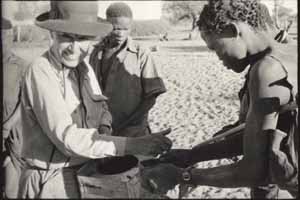In Memoriam
Air Date: Week of July 26, 2002
Living on Earth commentator Sy Montgomery remembers anthropologist Lorna Marshall who died earlier this month at the age of 103.
Transcript
MONTGOMERY: Let me tell you a story of something that happened to a friend of mine.
CURWOOD: Living on Earth commentator, Sy Montgomery.
MONTGOMERY: Lorna Marshall was an anthropologist, documenting the lives of the Bushmen of the Kalahari. One day on that vast, thirsty desert, she was pouring some water into a basin, when out of the sky came a huge black swarm of bees, African bees.
African bees can be quite aggressive. Africanized bees are the killer bees we always fear coming to invade the U.S. Attracted by the water, this swarm of killer bees is headed right towards Lorna. So what is she thinking? Not "Get me out of here." She told me many years later that her only thought was this: "Those poor bees. They must be dying of thirst."
Within a few seconds, desperate, thirsty killer bees are landing on Lorna’s hands and arms. Bees are falling into the bowl of water. Now, Lorna has another thought. "The bees are drowning," and she must save them. So she makes little rafts out of sticks for them so they can drink. And she stays with the bees until they’ve had their fill and buzz away.
This was what Lorna was like, for all of her 103 years on this earth, an astonishing, gracious and generous life that spanned three centuries, and ended earlier this month.
Lorna Marshall was best known for the Marshall Expedition, the first to document the lives of the Bushmen of Namibia in the early 1950s. With filmmakers and fellow anthropologists, with her daughter, Elizabeth, and son, John, Lorna and her husband Lawrence traveled three times to the great Kalahari Desert.

For nearly four years, they lived among the sand dunes and the thorns. The Bushmen had few possessions and were often hungry. Most Westerners would have found the conditions unbearably bleak. But all her life, Lorna Marshall saw beauty where others saw barrenness. She saw strength where others might see only scarcity. And when others might feel terror, she saw, instead, an opportunity to help.
Lorna was still writing her observations of the Bushmen when I first met her. She was still young then, in her late 80s. And immediately, I saw why her understanding of her study subjects was so detailed and penetrating. Her curiosity was based on caring. And whether working for civil rights at home, or helping a younger colleague begin a career, or building tiny rafts for thirsty bees, Lorna put her caring to action.
Lorna’s death was as miraculous as her life. On her last night, coyotes came in close to the house and sang. Dogs howled. Barn owls hooted loudly from the woods. With her daughter and companions at her side, Lorna died peacefully the next morning. On the front lawn, doves rose on whirring wings into the air, as if accompanying her spirit.
Lorna Marshall died as she lived, transfixed by this world of beauty, want and wonder. There was no room to fear what lay ahead.
[MUSIC UP AND UNDER: NEIL FINN, "SUMMER INTRO," RAIN, SOUNDTRACK, EMI, 2001]
CURWOOD: Commentator Sy Montgomery lives in Hancock, New Hampshire. To learn more about Lorna Marshall and other notable women adventurers, go to www.loe.org, and click on the "Women of Discovery" link.
[MUSIC UNDER]
Links
For more information about Lorna Marshall please visit our Women of Discovery page">
Living on Earth wants to hear from you!
Living on Earth
62 Calef Highway, Suite 212
Lee, NH 03861
Telephone: 617-287-4121
E-mail: comments@loe.org
Newsletter [Click here]
Donate to Living on Earth!
Living on Earth is an independent media program and relies entirely on contributions from listeners and institutions supporting public service. Please donate now to preserve an independent environmental voice.
NewsletterLiving on Earth offers a weekly delivery of the show's rundown to your mailbox. Sign up for our newsletter today!
 Sailors For The Sea: Be the change you want to sea.
Sailors For The Sea: Be the change you want to sea.
 The Grantham Foundation for the Protection of the Environment: Committed to protecting and improving the health of the global environment.
The Grantham Foundation for the Protection of the Environment: Committed to protecting and improving the health of the global environment.
 Contribute to Living on Earth and receive, as our gift to you, an archival print of one of Mark Seth Lender's extraordinary wildlife photographs. Follow the link to see Mark's current collection of photographs.
Contribute to Living on Earth and receive, as our gift to you, an archival print of one of Mark Seth Lender's extraordinary wildlife photographs. Follow the link to see Mark's current collection of photographs.
 Buy a signed copy of Mark Seth Lender's book Smeagull the Seagull & support Living on Earth
Buy a signed copy of Mark Seth Lender's book Smeagull the Seagull & support Living on Earth

